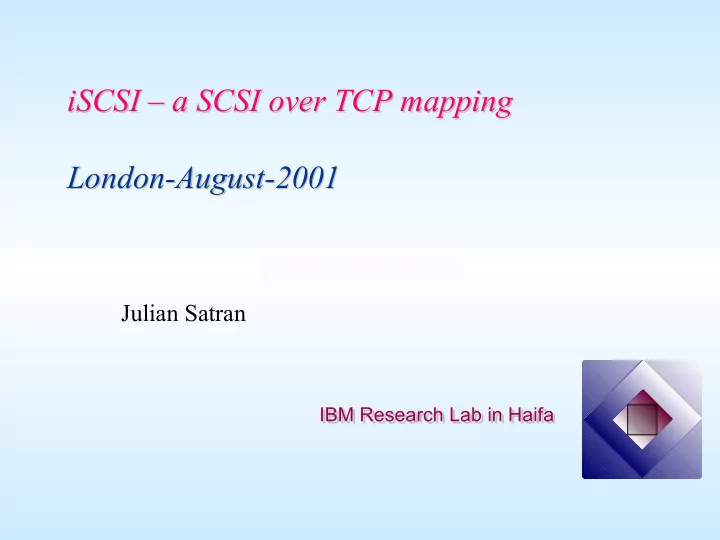

iSCSI – – a SCSI over TCP mapping a SCSI over TCP mapping iSCSI London- -August August- -2001 2001 London Julian Satran IBM Research Lab in Haifa IBM Research Lab in Haifa
Status Status ◆ Open “chapters” ◆ Security ◆ 2 “teams” working ◆ SRP+keying – requires inventing a scheme ◆ IKE+requires referencing a scheme ◆ Encryption will probably have to be mandatory to implement ◆ A separate RFC to be referenced by the main iSCSI doc ◆ Framing ◆ Open items ◆ NOP ◆ Login ◆ T10 ordering proposal ◆ Recovery summary
NOP (1) NOP (1) ◆ Issue - NOP may close the command window ◆ Solution proposed – simplify NOP ◆ Remove the P bit ◆ Ping Data if present indicate by DataSegment Length ◆ Convey the answer need through ITT/TTT ◆ No valid ITT/TTT no answer needed ◆ Mandate Immediate if ITT is not valid
NOP (2) NOP (2) ◆ ITT valid means Initiator wants answer ◆ TTT valid means Target wants answer ◆ ITT & TTT cannot be both valid in a Nop- In (to break the loop) ◆ ITT & TTT can be both valid on a Nop-Out (three way handshake)
Login (1) Login (1) ◆ Issues ◆ General Structure ◆ Individual Parameters ◆ General Structure in 07 ◆ 2 phases ◆ Implicit ◆ Optional ◆ Overall concern – reduce number of handshakes and keep footprint low ◆ Perceived programming complexity not a concern
Login (2) Login (2) ◆ Proposals ◆ SecurityContextComplete alone – Eddy Quicksall ◆ Mandatory Security – Robert Russell ◆ Both Explicit & Optional ◆ Through brackets SecurityPhase/OperationalPhase=<start|end> ◆ Through a binary this-phase/next-phase code and reuse of the final bit
Login (3) Login (3) ◆ SecurityPhase/OpPhase =<start|end> are the “brackets” ◆ Parameters for one phase only ◆ Legal ◆ I->T Login SecurityPhase=start,…. Parameters …., SecurityPhaseEnd+F T->Login SecurityPhase=start,….Parameters …, SecurityPhaseEnd+F
Login (4) Login (4) ◆ Some details about the binary-phase and final/bit proposal ◆ Byte 38 in Login & Text – has 2 Nibbles Current/Next ◆ Final bit means ready to move to next ◆ Phases are 0-Security, 1-Op, 15-FF ◆ Parameters are from one phase only ◆ After the F bit Handshake they move on
Login (3) Login (3) ◆ Miscellaneous ◆ Common Header/Data CRC Negotiation (either both are on or both are off) ◆ Drop Security Digest Negotiations ◆ Vendors can use them as vendor specific ◆ Drop Security Digests altogether ◆ Nobody can use them ◆ Hex/Decimal – Leave only hex?
T10 – – serialization interlock serialization interlock T10 ◆ Current proposal – Busy, Task Set Full and Reservation Conflicts become Check Condition generators under the control of bit in the LU Control Mode Page ◆ Issue - in single queue (per multiple initiators) devices this can cause a Denial Of Service situation ◆ Solutions: ◆ Leave as it is – argue the case in T10 ◆ Use UA that with a recently proposed/adopted change can have the same serialization effect but limited to one initiator even on single queue devices ◆ Jim Hafner and Julian Satran will participate at the next T10 meeting attempting a closure on this issue
Interlock – – Proposal Outline Proposal Outline Interlock ◆ Add an Interlock Bit in the LU Control Page ◆ For Busy/Task Set Full/Reservation Conflict if a command form a specific initiator gets rejected the target has to “remember this event” per initiator (3 bits - cleared also by some actions like resets) ◆ When the the LU state changes AND the interlock bit is 1 AND the Busy/Task Set Full/Reservation Conflict reject- remembered is 1 the target enters a UA pending state for the specific initiator (the “remember” bits could be cleared here or later) ◆ This UA condition remains “active” until explicitly cleared by an appropriate command and prevents other commands being accepted
Interlock – – Proposal Outline (cont.) Proposal Outline (cont.) Interlock ◆ How is it better: ◆ Confined to one initiator ◆ Currently executing commands are not blocked as in ACA (ACA mandates command to be blocked in order to avoid generating a second sense) ◆ Successfully sent AER means (at the target getting ack!) – see SAM-2
Recovery (summary) Recovery (summary) ◆ SNACK is weak but useful ◆ The fast path price is paid ◆ A form of ACK might relax the need for data replay buffers at target
Recommend
More recommend